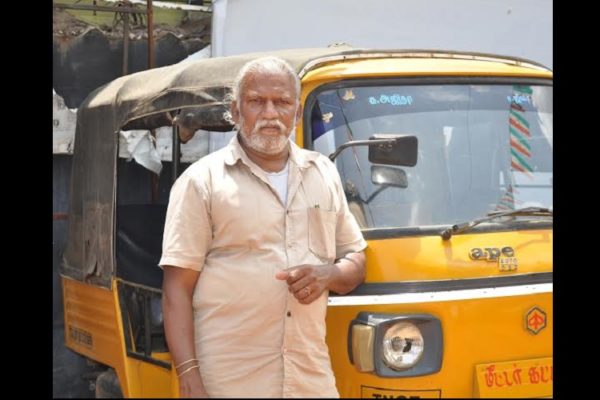Auto Chandran’s caller tune is “Ulagam priandhadhu enakaaga”, the evergreen MGR song from “Paasam”, which means “the world was born for me.”
It certainly seems appropriate for M Chandra Kumar, the 54-year-old auto driver from Coimbatore, Tamil Nadu. From running away from home and ending up in jail where he was brutally tortured, Chandran went on to become a celebrated author, who has penned as many as seven novels. It was based on his book, “Lock Up” (2006) that the award-winning Tamil film, “Visaranai” (2015) was made.
This chilling film on police brutality and human rights violations is India’s nomination for the Academy Awards this year in the Best Foreign Film category. Directed by Vetrimaaran, “Visaranai” has won several international accolades and three national awards. Many believe that the film is India’s strongest contender yet for the Oscars.
In 1983, Chandran was working at a shop in Guntur, Andhra Pradesh, when he was picked up by policemen late in the night. He was arrested on the suspicion that he was part of a gang of thieves that indulged in petty robbery.
How much of “Visaranai” is based on true events?
“The next thirteen days were brutal,” recalls Chandran, speaking to The News Minute. “We were in a tiny cell with barely any air.” The policemen needed to resolve the case quickly and they therefore tortured Chandran and the others who’d been arrested wrongfully to draw a confession out of them.
“What you see in the first half of the film about the human rights violations that go on in police custody, is what more or less happened,” says Chandran. “Except for a hospital visit, we were not allowed to go anywhere.”
Finally, Chandran and his fellow accused were released on September 27. It will be 33 years since the incident in another four days.
On the making of “Visaranai”
In 2014, director Vetrimaaran, was in conversation with Thangavelan, also known as Gnani, who had worked with ace film-maker Balu Mahendra in a few movies. The two of them were discussing and debating the role of art in society. It was then that Gnani said, “I think art should represent the marginalized from now on. It should give voice to those whose rights are suppressed. It should break away from celebrating authority and systems of power that we’ve been showing in our films for so long.”
Vetrimaaran concurred with Gnani’s views and asked him if he knew any such story on which he could base his next film. Gnani told him about his friend Chandran’s “Lock Up”, an award winning novel that had sold many thousand copies in Tamil Nadu. In fact, Gnani had been thinking of writing a screenplay based on the film. He told Vetrimaaran that Chandran would be more than happy to have someone of the director’s capabilities make a film on the book.
Vetrimaaran read the slim 148-page novel overnight and called Gnani the next day to tell him that his mind was made up. This was going to be his next film. A month later, Chandran received a call from the director.
“I was very happy,” says Chandran. “I had seen “Aadukalam” and I knew how talented he was. Besides, I trusted Gnani, my friend.”
When Chandran asked Vetrimaaran if he’d use his name in the film, the latter told him that though he was a well-known novelist, only readers knew of him. “With my film, at least one crore people will come to know of you,” Vetrimaaran said.
He’s certainly lived up to that promise, smiles Chandran.
“I gave him my 100% support. I wanted to dedicate this film to the marginalized everywhere,” says Chandran. The film-making ended on December 30, 2014.
The rest, as they say, is history.
On his books
Though Chandran is now mostly known for “Lock Up”, his novels explore a wide range of themes. This writer, who dropped out of school after Class X and eventually became an auto driver, is a self-taught intellectual.
He’s written about American capitalism and how it exploits the rest of the world, the freedom fighter and political activist Jeevanandam, and the attacks on lower caste people that he has witnessed in person, among other subjects.
Chandran’s writings display a keen engagement with sociopolitics and he believes strongly in giving voice to the oppressed.
“Someone has to write about them too,” he says wryly.
When “Visaranai” came out, not everyone was pleased. People in the police force said that the film portrayed them in poor light. Does Chandran feel that “Visaranai” exaggerated certain things? After all, the film doesn’t follow the same plot as his book.
“Lock-up deaths continue to happen, don’t they?” Chandran counters. “It’s true that the system has controls but who are the people in the system? They work for profit. They don’t care who the real criminal is. They just want to catch some guileless fool and put him inside as the accused.”
Pointing out that so many people die in the process of the interrogation, Chandran says, “Why have courts then? The police can investigate the case, they have no right to torture anyone. They don’t seem to have any belief in the justice system themselves.”
On the nomination
Chandran is obviously elated that “Visaranai” has been selected as India’s nomination for the Oscars.

“But do you know something strange? Nobody wants to take credit for this film!” he exclaims. “I strongly feel that the victory is Vetrimaaran’s. And of course, the actors and the rest of the crew. It’s they who took the story and sculpted it into a film. But they think it’s my victory.”
Chandran goes on to add that earlier, his story was known only in Tamil Nadu, among readers who read Tamil books. Now, there were people world-over who knew what had happened in those 13 days he suffered in police custody.
“The true purpose of art is to destroy human ego,” Chandran says. “The humility of everyone involved in this film, their willingness to share its success, proves that what we’ve created together is real art.”
What next?
Chandran, lives with his wife Subalakshmi (also known as Ajitha) and his daughter, Jeeva. Two other important family members are Rock, the Pomeranian, and Butterball, the Dalmation.
Will he fly to the Oscars? “I will, if they take me!” laughs Chandran. In the meantime, Chandran is busy with his next book. It’s on the abuse and human rights violations that the elderly face.
“I will always speak up against authority and power,” Chandran says. Remember that heart-breaking scene in “Visaranai” when Pandi refuses to beg for mercy even as the cops rain blows on him? You can hear the steel behind that moment in Chandran’s quiet resolve.







Leave a reply